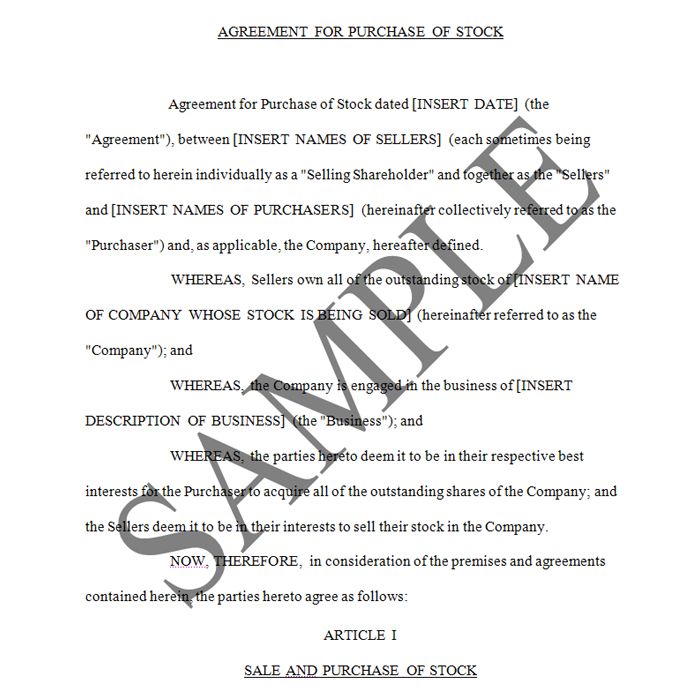
This Form is an Agreement for the purchase of the stock of a closely-held company from its shareholders by a group of individuals. Note the detail in Section 2.2 regarding possible adjustments to the purchase price. This may not be necessary in every agreement of this type. It is included here to illustrate that the fair value of a business may not be known on the Closing Date, particularly if there are seasonal issues, contract renewals, etc. that may have an influence on the purchase price.

This Form is an Agreement for the purchase of the stock of a closely-held company from its shareholders by a group of individuals. Note the detail in Section 2.2 regarding possible adjustments to the purchase price. This may not be necessary in every agreement of this type. It is included here to illustrate that the fair value of a business may not be known on the Closing Date, particularly if there are seasonal issues, contract renewals, etc. that may have an influence on the purchase price.
Note the numerous representations and warranties required of seller in Section 4. Since the purchaser is acquiring the stock of seller, the purchaser is vulnerable to taking on all of seller’s liabilities. The representations and warranties are required to give purchaser the opportunity to offset money due to seller, if any, or to argue for indemnification should any such representations and warranties prove to be untrue.
Note also the references in Section 7.1 to a Consulting Agreement and a Covenant Not to Compete as being integral to this transaction. Such supplemental agreements are often required by the purchaser to make certain that the seller will be cooperative in introducing the purchaser to customers, clients, etc., and to be certain that the seller will not launch a competing business after the closing has occurred.
Author:
Steven G. Siegel is president of The Siegel Group, a Morristown, New Jersey - based national consulting firm specializing in tax consulting, estate planning and advising family business owners and entrepreneurs. Mr. Siegel holds a BS from Georgetown University, a JD from Harvard Law School and an LLM in Taxation from New York University.
He is the author of several books, including: Planning for An Aging Population; Business Entities: Start to Finish; Taxation of Divorce and Separation; Income Taxation of Estates and Trusts, Preparing the Audit-Proof Federal Estate Tax Return, Putting It Together: Planning Estates for $5 million and Less, Family Business Succession Planning, Business Acquisitions: Representing Buyers and Sellers in the Sale of a Business; Dynasty Trusts; Planning with Intentionally-Defective Grantor Trusts; The Federal Gift Tax: A Comprehensive Analysis; Charitable Remainder Trusts, Grantor Trust Planning: QPRTs, GRATs and SCINs, The Estate Planning Course, The Retirement Planning Course, Retirement Distributions: Estate and Tax Planning Strategies; The Estate Administration Course, Tax Strategies for Closely-Held Businesses, and Tort Litigation Settlements: Tax and Financial Issues.
Mr. Siegel has lectured extensively throughout the United States on tax, business and estate planning topics on behalf of numerous organizations, including National Law Foundation, AICPA, CCH, National Tax Institute, National Society of Accountants, and many others. He has served as an adjunct professor of law at Seton Hall and Rutgers University law schools.
The Siegel Group provides consulting services to accountants, attorneys, financial planners and life insurance professionals to assist them with the tax, estate and business planning and compliance issues confronting their clients. Based in Morristown, New Jersey, the Group has provided services throughout the United States. The Siegel Group does not sell any products. It is an entirely fee-based organization.
Contact the Siegel Group through its president, Steven G. Siegel, e-mail: [email protected] .